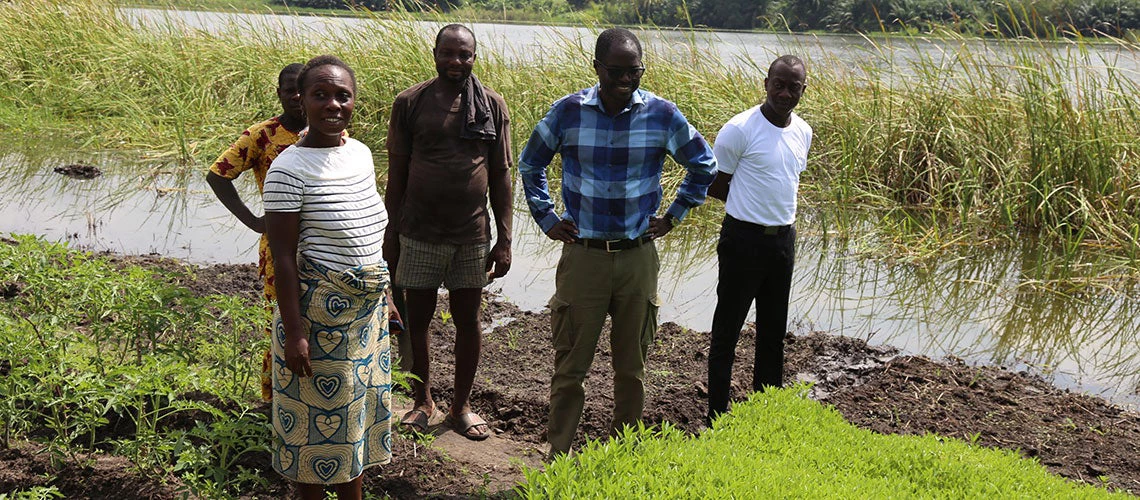 Pourquoi les petites exploitantes agricoles sont des actrices incontournables de la lutte contre la pauvreté au Bénin
Pourquoi les petites exploitantes agricoles sont des actrices incontournables de la lutte contre la pauvreté au Bénin
When I saw Agnès’s market garden while on a field trip to Logohoué a few weeks ago, I gained a greater appreciation of our obligation to help rural communities push back the frontiers of poverty. In this village of the Houéyogbé commune in southwest Benin, Agnès runs a cooperative largely composed of women. The goal? Help them get established in horticulture to improve their households’ daily living conditions. These intrepid women are already growing vegetables, cabbage, tomatoes, and other organic leguminous plants on one and a half hectares of developed land on the banks of the Dati river. Water is accessible, but harnessing it remains challenging.
Lacking a motor pump, and with only two watering cans, the women use basins to collect the water and irrigate the beds. Such challenges slow the productivity of their small farm despite the healthy dose of energy that they expend on this work. The land is there, the water is available, the drive to succeed is written on their faces. All these women need to perform miracles is a small boost.
The complaints they shared with me fall into two categories: having access to a sustainable, lake-fed crop irrigation system and boosting their organic fertilizer production capacity. They can take care of the rest.
The World Bank-financed Agricultural Productivity and Diversification Project (PADA) was designed to give them this boost. They received seeds to diversify their crops, five above-ground tanks, and catfish fingerlings to establish their fish farming businesses. They also received training in family farming of poulets bicyclettes (backyard chickens). I was stunned by the boundless energy of these poorly equipped women and the enthusiasm emanating from them. I promised them I would return in one year to witness the progress they will have achieved. I hope that by then, they will be champions of organic market gardening products throughout the department of Mono and beyond.
Small support that makes a big difference
The results emerging from Agnès’s cooperative demonstrate that modest support to small farmers can have a significant impact. The World Bank's drive to eliminate extreme poverty will not come to fruition unless we develop approaches that allow us to have a more direct impact on communities through our operations.
The Systematic Country Diagnostic (SCD) for Benin revealed that the country’s weak productivity is hampering its ability to reap the benefits of its vast agricultural potential. Transforming agricultural production should help create jobs and wealth, particularly for rural communities. Productivity will only be achieved if we help disseminate simple technologies, bring innovation to the sector, and provide rural communities with access to energy and digital technology.
The PADA complements the mission of another project, the Additional Financing for West Africa Agricultural Productivity Program (WAAPP), which helped the government make modern technologies available to rural actors to promote agricultural value chains. The WAAPP closed on December 31, 2019, and approximately 995,800 people benefited from it, of whom 41.54% are women. Along with the Digital Rural Transformation Project, the PADA will soon be bolstered by another project in the agricultural sector. However, we must do more for women, who represent 52% of the rural population in Benin, by providing them with small grants for production and processing, in addition to helping improve their access to markets. Helping them boost their incomes will undoubtedly contribute to the elimination of poverty in rural areas.
I am betting on the women of Logohoué and on the thousands of other women farmers who are certain that agriculture can transform their lives.


Join the Conversation